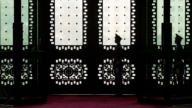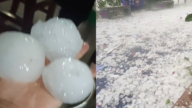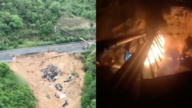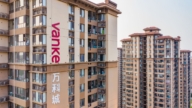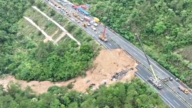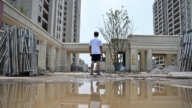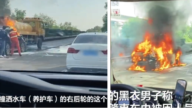【新唐人2011年3月21日讯】大陆官方表示要继续扩建核电站。大陆主要的核电投资和运营公司——“中广核集团”说,“中国核反应炉厂房可抵抗万年一遇的地震”。旅德工程专家王维洛指出,“抗震”度数统计的是,地震对于地表建筑物的破坏“裂度”,与洪水出现的频率,所谓“百年一遇”不同。
《成都商报》等多家大陆媒体刊登有关:“中广核集团”回应中国核电安全问题,表示:中国反应堆厂房可抗“万年一遇”地震。
“中广核集团”的高调回应,遭到中国网友一边倒的质疑、嘲讽和炮轰。之后,“中广核集团”在官方微博上解释:“‘万年一遇’是一种通俗说法。指‘发生的概率’极低。”
工程专家王维洛博士表示,“对地震没有万年一遇这个概念”,从来没有这样统计的。而地震对于地表建筑物的破坏,是按照地震的“裂度”来计算的。最简单的公式是“震级”加上2或3,就等于“地震的裂度”。
王维洛:“如果我们说洪水、说暴雨、说干旱,我们还可以说是百年一遇的、五十年一遇的,因为它是靠出现的频率来计算。那么对地震而言,它是从来没有这样统计的。它应该说我们这个厂房可以抵抗十度的地震裂度,是‘度’不是‘级’。”
“中广核集团”目前拥有深圳大亚湾核电站、岭澳核电站一期、岭澳核电站二期1号机组等,共500万千瓦在运行的核电机组,是中国主要核电投资和运营方之一。
王维洛:“相对于现在可再生能源来说,核电站其实是一个没有前途的工业,是在西方社会里面淘汰的工业。但是为了他们最后还能挣一次钱,他就把技术全部出卖给像中国这样的国家。”
在日本11号的天灾引发了核泄漏之后,重视绿色能源和可再生能源的西方国家,纷纷从新考量自己的核安全问题。德国总理默克尔14号宣布,德国政府将对所有核电厂进行检验,并且暂缓了“延长现有核电站使用期限”的决定。
而大陆方面,中国环保部副部长张力军12号表示,中国不会改变核能发展计划。刚刚结束的人大通过的十二五规划,其中重点的“核发展计划”显示,要将现有的核电站装机容量,增加近七倍。
网友在大陆网站留言说,“在大自然面前,人类是渺小的,人类能掌握的科学是粗浅的。多点敬畏,或可少受点苦难,或可免步恐龙的后尘。”
新唐人记者赵心知、李若琳采访报导。
Withstand 10,000 Year Earthquake?
China’s authorities declared that they will carry on
their vigorous plan for nuclear power development.
China National Nuclear Corporation (CNNC),
China’s prime nuclear investing
and operating corporation, said: “China’s nuclear
reactor plants can withstand a 10,000 year earthquake.”
A Chinese engineering expert residing in Germany,
Wang Weiluo, said that ‘earthquake intensity’
measures the degree of damage an earthquake
could cause to buildings. This is a different concept
from that of once in 100 years flood frequency.
Chinese media like Chengdu Business News
reported the responses of CNNC to China’s nuclear
safety issues: “China’s nuclear reactor plants
can withstand a 10,000 year earthquake.”
The bragging of CNNC provoked China’s netizens’
questions, criticism and ridicule.
Later, the CNNC explained on its official microblog:
“’Once in 10,000 years’ is a familiar expression,
which means an extremely low probability.”
Engineering expert, Dr. Wang Weiluo, said:
“There is no such a concept as
‘once in 10,000 years’ for earthquakes.
Earthquakes have never been measured this way.
Instead, an earthquake’s damage to buildings
is measured by the earthquake’s intensity.
The simplest formula:
earthquake magnitude multiplied by 3/2,
will give you the earthquake’s intensity.”
Wang Weiluo: “For example, floods, storms,
or droughts, may be described
as once in 100 years, or once in 50 years,
because they are measured with frequencies.
But an earthquake has never been measured
in this way. They could say that their plants
can withstand an earthquake of intensity 10.
Notice that this is ’intensity’ not ‘magnitude.’”
Currently CNNC owns a total of 500 million kilowatts
of nuclear power generating units, including Daya
Bay Nuclear Power Station in Shenzhen City,
Ling Ao Nuclear Power Station (Phase 1), and
Ling Ao Nuclear Power Station (Phase 2)’s Unit 1.
CNNC is one of China’s major nuclear
investing and operating corporations.
Dr. Wang: “Compared to other ongoing
renewable energy resources,
nuclear power is an unpromising industry,
which has been washed out in western societies.
But in order to make more money,
these western countries sold their
nuclear technologies to other countries, like China.”
Since Japan’s nuclear leak on March 11th,
which resulted from the natural disaster,
many western countries who emphasize
green and renewable energy, have started
to reconsider their nuclear safety programs.
German Chancellor, Angela Merkel, declared
on March 14th that the German government
will examine all their nuclear power plants
and the decision on whether to
“extend life of existing nuclear power stations”.
However, in China, Zhang Lijun, Minister
of Environment Protection in the CCP regime,
declared on March 12th that China will not change
its plan for nuclear power development.
The 12th Five-Year Plan approved in the recent
National People’s Congress includes an important
“nuclear development plan” which shows,
the capacity of all existing nuclear power stations
will be expanded nearly seven times.
Some Chinese netizens wrote: “Before nature,
human beings are insignificant.
The knowledge we can grasp is superficial.
We might avoid some disasters
and extinction, like the dinosaurs,
if we respect nature.”
NTD reporter Zhao Xinzhi and Li Ruolin.


